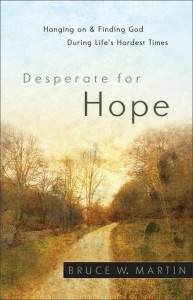 Bruce W. Martin’s new book, Desperate for Hope: Hanging on and Finding God During Life’s Hardest Times, is about suffering. It is direct, honest, thought-provoking, and moving. He has done his homework to create a book that analyzes the issue from a Christian perspective with theological rigor, but his tone is not academic or philosophical. It is personal. Throughout the book he refers just as often to his own “perfect storm” of catastrophes as he does to examples from the Bible or from the lives of others. He does not shy away even from the suffering that he brought about in his own life and that of his family. I have read plenty of books on this topic, but I highly recommend this one for its forthright treatment of a difficult issue.
Bruce W. Martin’s new book, Desperate for Hope: Hanging on and Finding God During Life’s Hardest Times, is about suffering. It is direct, honest, thought-provoking, and moving. He has done his homework to create a book that analyzes the issue from a Christian perspective with theological rigor, but his tone is not academic or philosophical. It is personal. Throughout the book he refers just as often to his own “perfect storm” of catastrophes as he does to examples from the Bible or from the lives of others. He does not shy away even from the suffering that he brought about in his own life and that of his family. I have read plenty of books on this topic, but I highly recommend this one for its forthright treatment of a difficult issue.
Here are some of the elements of Martin’s own “perfect storm” that hit in 2002: “Out of work, I hadn’t received a paycheck for sixteen of the previous twenty-four months. We had just moved back to Huntsville, Alabama, from Denver, Colorado, after a colossal failure at church-planting. Drowning in a sea of credit card debt, we lived about thirty days from bankruptcy. To top it all off, my wife and I both suffered from near-clinical depression.” Martin’s deepest pain during that period, however, came when his daughter Zoe, whom he and his wife were adopting and whom they had raised for ten months, was taken away from them when the birth mother changed her mind. “We thought we were going to die,” Martin writes. “And to be honest, that would’ve been fine with me.”
Martin seeks the truth about suffering, no matter how disturbing that truth may be. Much of the book focuses on Job, but he analyzes the suffering many other biblical passages as well. The Christmas story, for example, is not the sentimental tale so often portrayed in children’s church dramas, but it is a story of struggle, pain and danger. It is the story of a spiritual battle against forces of evil. When Jesus Christ himself comes into the world, he is not exempt from trouble. In fact, he faces it from the moment of his birth, and his family even before that. When Mary “ponders all these things in her heart,” Martin speculates that some of her thoughts might have been, “Why does this have to be so hard? Where is God in all of this? Couldn’t he have planned this out a little better?”
Martin avoids easy answers to suffering, but he does seek answers. He delves into reasons for suffering and the spiritual outcomes of it. He shows how God redeems it in the stories told in scripture and in the lives of people today. I won’t try to summarize all his arguments, but I’ll offer a sampling of a few of my favorite quotes:
• “Here’s what I’m learning about God: God is more intent on perfecting us through trouble than protecting us from trouble.”
• “God is always up to something. And because he’s good, that something will always be good. No matter how bad the storm is, and no matter who caused it, God is at work. It might look to you like he’s sleeping, but he’s at work behind the scenes.”
• “David understood the secret to peace in the middle of chaos: giving up control. No longer trying to dictate the outcome. Trusting God—no matter what, no matter when.”
I met Bruce Martin a few years ago at Mount Hermon Christian Writers Conference, where I got to read part of an earlier draft of this manuscript. He has been working and honing his material—and living the reality of it—for years, and readers will benefit from his exploration of one of the most difficult topics in life.
Comments 2
Well said.
This book may be ideal for a relative of mine who is going through a difficult time. I have recommended it to her.